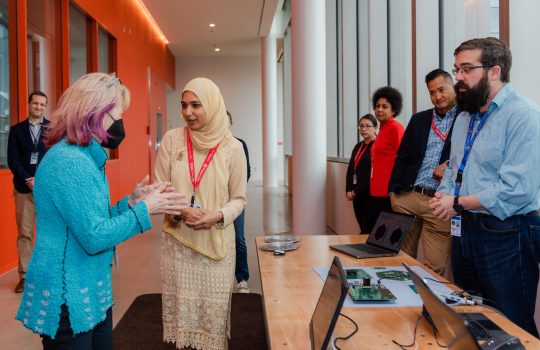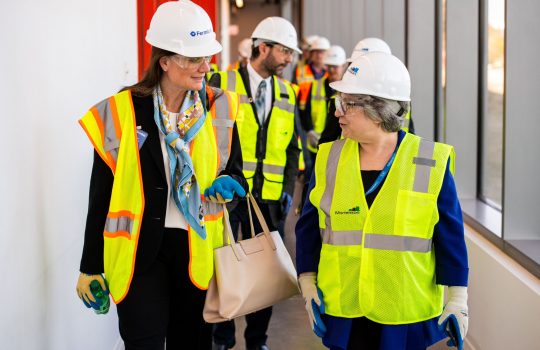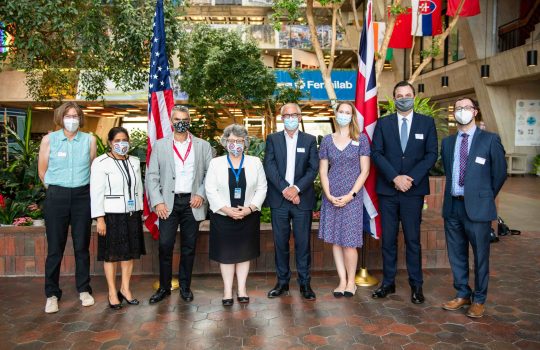A five-member delegation from the French National Centre for Scientific Research’s Institut National de Physique Nucléaire et de Physique des Particules, led by IN2P3 director Reynald Pain, visited the U.S. Department of Energy’s Fermi National Accelerator Laboratory on Sept. 2. Fermilab Director Lia Merminga and Whitney Begner, deputy manager of DOE’s Fermi Site Office, welcomed the visitors.
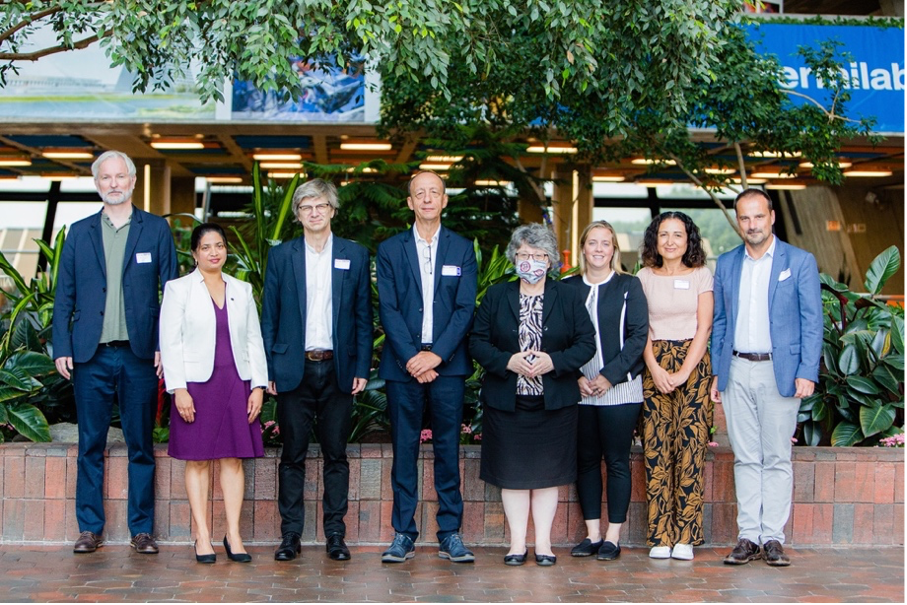
A delegation from the Institut National de Physique Nucléaire et de Physique des Particules in France visited Fermilab on Sept. 2. From left: Berrie Giebels, deputy director of IN2P3; Hema Ramamoorthi, Fermilab international engagements director; Arnaud Lucotte, IN2P3 scientific director for accelerators; Reynald Pain, director of IN2P3; Lia Merminga, director of Fermilab; Whitney Begner, deputy head of the DOE Fermi Site Office; Marcella Grasso, IN2P3 scientific director for nuclear physics and applications; and Laurent Vacavant, IN2P3 scientific director for particle and hadronic physics. Photo: Tom Nicol, Fermilab
The delegation met with Fermilab management and scientists to discuss IN2P3-Fermilab collaboration in accelerator and neutrino programs. The visitors also obtained an overview of the lab’s quantum research, scientific computing efforts and theory programs. IN2P3 is a major partner of the PIP-II particle accelerator project and the international Deep Underground Neutrino Experiment, hosted by Fermilab.
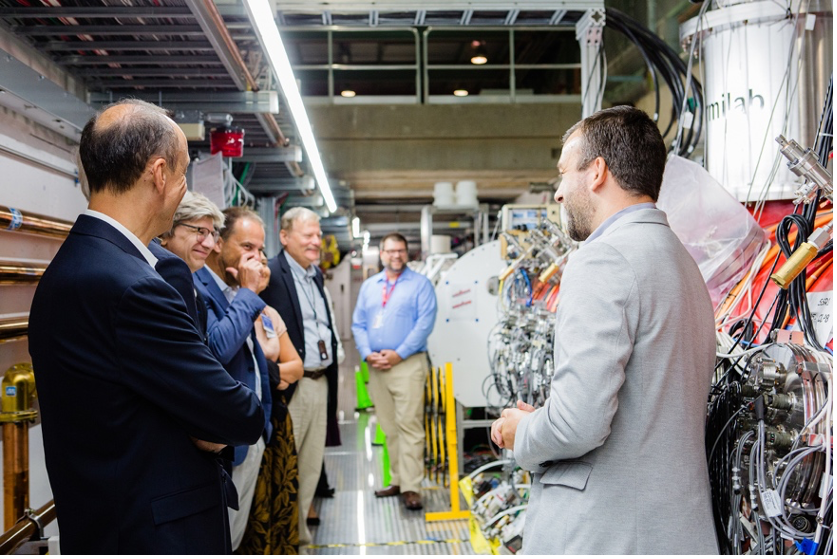
Donato Passarelli (from right), Michael Geelhoed and Rich Stanek give the IN2P3 delegation an overview of the PIP-II particle accelerator project at Fermilab. French institutions have been providing valuable contributions for the development and testing of SSR2 superconducting cavities for PIP-II. Photo: Tom Nicol, Fermilab
The IN2P3 delegation also virtually met with Harriet Kung, deputy director for Science Programs in the DOE Office of Science and acting associate director for the DOE Office of High Energy Physics. She thanked the delegation for their continued support and the substantial contribution of key technologies in the neutrino and accelerator programs.
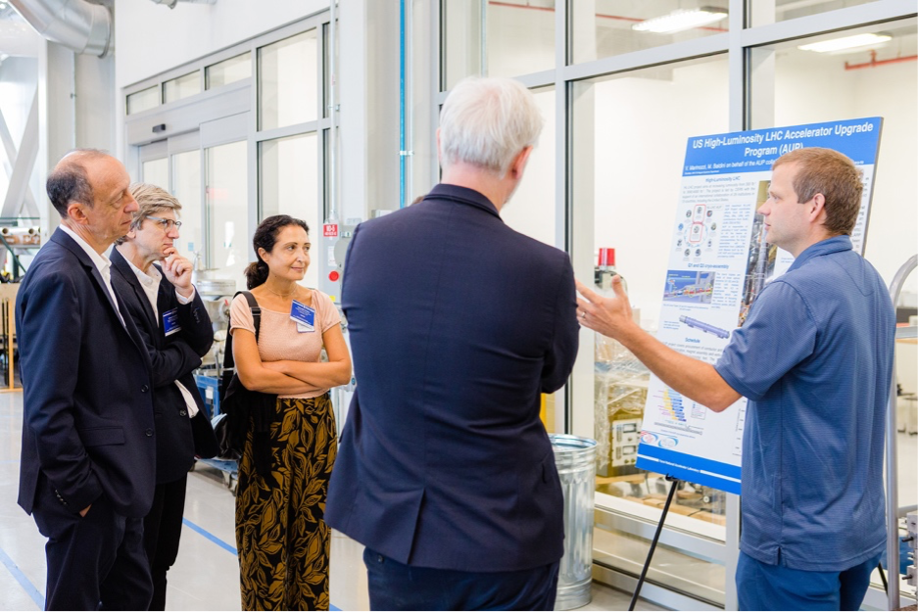
The French visitors listen to Thomas Strauss (right), who highlights Fermilab’s contributions to the High-Luminosity Large Hadron Collider Upgrade. Photo: Tom Nicol, Fermilab
“IN2P3’s collaboration with Fermilab and their contributions to PIP-II and DUNE are examples of how important international partnerships are in advancing accelerator technologies and global neutrino research,” said Merminga.
The delegation spent the day at Fermilab talking with scientists and touring various research facilities. The visit provided an opportunity for the delegation to see the advances in the LBNF/DUNE neutrino project and the PIP-II particle accelerator project. The tour included Fermilab’s work on superconducting cavities for PIP-II as well as superconducting magnets for the High-Luminosity Large Hadron Collider upgrade; the assembly of the Short Baseline Neutrino Detector and work on the CMS detector upgrade at the LHC. The visitors also toured the Superconducting Quantum Materials and Systems Center.
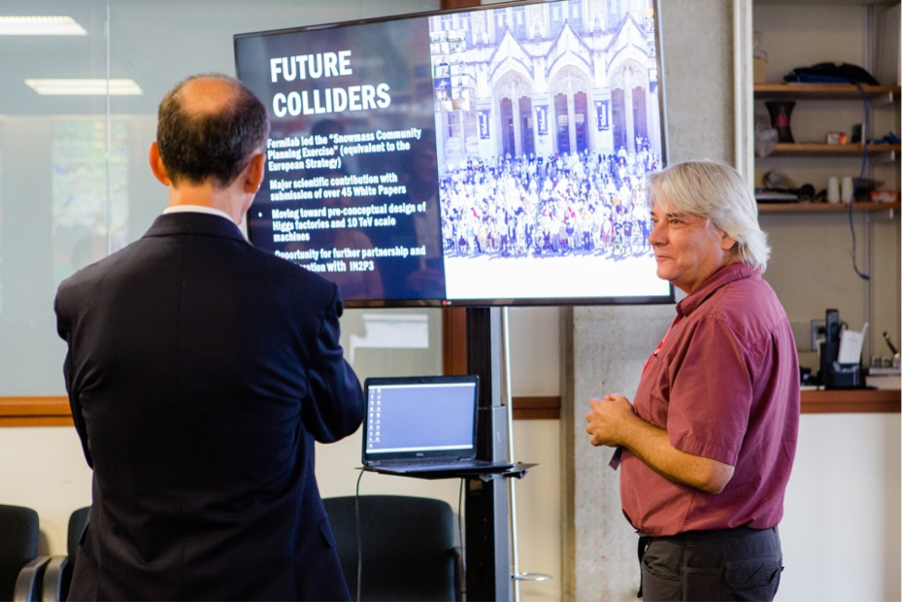
Frank Chlebana (right), deputy department head in Fermilab’s Particle Physics Division, briefs the visitors from France on Fermilab’s work on the CMS experiment at CERN and highlighted opportunities for joint research and development efforts for the design of future high-energy particle colliders. Photo: Tom Nicol, Fermilab
In addition to Director Pain, IN2P3 delegates on the visit included Deputy Director Berrie Giebels; Laurent Vacavant, scientific director for particle and hadronic physics; Arnaud Lucotte, scientific director for accelerators, detectors and technology; and Marcella Grasso, scientific director for nuclear physics and applications.
Fermi National Accelerator Laboratory is supported by the Office of Science of the U.S. Department of Energy. The Office of Science is the single largest supporter of basic research in the physical sciences in the United States and is working to address some of the most pressing challenges of our time. For more information, please visit science.energy.gov.

